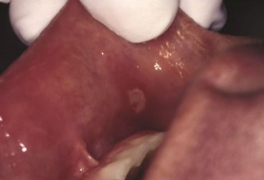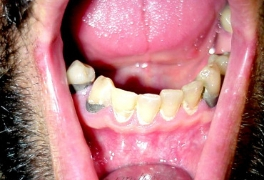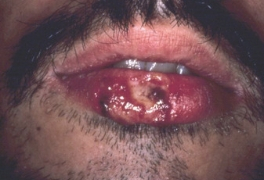Mouth Sores
They are annoying, painful, and embarrassing and can interfere with smiling, eating, and speaking. They affect millions of people every year and are caused by a number of different factors. While some mouth sores are more of a nuisance than anything else, others can be especially harmful to your dental health and overall health.
Canker Sores

The canker sore most commonly appears on the inside of the mouth and is not considered contagious. There may be only one canker sore in your mouth or several and, unfortunately, they often return.
The actual cause of these annoying mouth sores is unknown. However, certain factors such as stress; trauma; food allergies; eating certain foods like chocolate, nuts, and citrus fruits; and vitamin deficiencies appear to trigger the onset of a canker sore.
There are several over-the-counter options for relieving canker sore pain including antibacterial mouthwashes, pain-relieving gels, and saltwater rinses. Consult your dentist if you aren’t sure which remedy to use. Most canker sores heal within two weeks. However, if yours lasts longer than that, contact your dentist.
Meth Mouth

Methamphetamine is an inexpensive drug that is easy to make from over-the-counter ingredients. Known by several street names including “Crystal Meth” and “Meth,” it is a highly addictive drug, and its use is increasing in the United States.
Methamphetamine is a powerful central nervous system stimulant that produces wakefulness, appetite suppression, irritability, and aggression. It can cause shortness of breath, nausea, irregular heartbeat, high blood pressure, convulsions, and permanent brain damage. It also leads to rampant tooth decay, known as “Meth Mouth” in the dental community.
The extensive tooth decay resulting from Meth Mouth is due to the drug’s acidic nature and its tendency to cause dry mouth. Without adequate saliva to wash away food and neutralize the acids produced by plaque, extensive decay can occur. Because a methamphetamine high can last up to 12 hours, many users have long periods of poor oral hygiene. In addition, while they are high, users often crave sugary beverages and grind or clench their teeth. Some meth users’ teeth are blackened, rotted, or have fallen out. Often, their teeth cannot be saved and must be extracted.
Speak to your dentist if you have questions about Meth Mouth. Education is the key to identifying and preventing drug abuse.
Oral Cancer

Oral cancer often starts as a tiny, unnoticed white or red spot or sore anywhere in the mouth area, including the lips, gum tissue, tongue, or the roof of your mouth. Other signs of oral cancer include a sore that bleeds easily or does not heal; a lump or thickening in your mouth or neck; pain, tenderness, or numbness anywhere in your mouth or on the lips; and difficulty chewing, swallowing, speaking, or moving the jaw or tongue.
According to the Oral Cancer Foundation, approximately 53,000 people in the United States will be diagnosed with oral or oropharyngeal cancer this year, and it will cause more than 9,750 deaths. On average, 57% of those diagnosed with the disease will survive more than five years. When found in early stages, oral cancers can have an 80-90% survival rate. However, the majority are found as late-stage cancers when they may have spread to other locations, such as the lymph nodes in the neck area.
Oral cancer most often occurs in people who use alcohol and/or any form of tobacco, such as cigarettes or smokeless tobacco. Regular dental checkups that include an oral cancer screening are essential in early detection. A biopsy is the only way to definitively diagnose oral cancer.
You can take an active role in preventing oral cancer by discontinuing any tobacco use and drinking alcohol in moderation. In addition, limit your exposure to the sun.
Oral Herpes

Oral herpes, most commonly known as cold sores, is an infection caused by the herpes simplex virus. This oral lesion begins as small, usually painful, blisters that normally appear on the lips or inside the mouth. These blisters and open sores are extremely contagious. They may occur through contact with infected razors, towels, drinking glasses, utensils, and other shared items. Oral herpes can be spread through contact such as kissing or through oral sex. Direct contact for even a short amount of time is enough to spread the virus.
Herpes cannot be cured. Once you catch it, you will always have it. Even when you don’t have any symptoms, the virus is always in the body and can flare up at any time. Your health care provider can prescribe medications that quicken healing, making symptoms less painful. However, these medications don’t kill the virus and don’t prevent you from getting outbreaks in the future.
Sexually transmitted diseases (STDs) can be spread through oral sexual activities. STDs can involve a variety of diseases, including gonorrhea, chlamydia, and AIDS/HIV. Some infections cannot be treated and have permanent consequences. Please talk to a health care professional if you have any questions about STDs.

